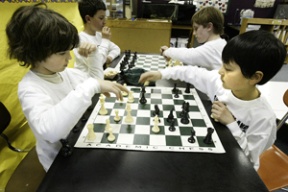But young chess players learn more than sound strategy.
In some cases, their trophies towered over them like a queen over a pawn.
But fresh from a road trip to Vancouver, Wash., there were no signs of an inferiority complex among members of the Bainbridge Black Knights chess club.
“You earn respect,” said sixth-grader Eryn Cohen, captain of a team that returned from last weekend’s state tournament with a truckload of individual and team hardware.
That hardware was on display last week at Commodore Options School as players and parents celebrated their success.
Cohen, one of about 40 Bainbridge students who made the trek south, netted a third place trophy, while fellow-sixth grader Marcus Woltjer took home fourth. Overall, students at Odyssey won four trophies; Wilkes, Ordway and home schoolers won one each.
Some 1,300 students from 191 different schools around the state competed in the event, the largest Washington State Chess Tournament in history.
Despite the proponderance of video gaming among today’s youth, chess is gaining popularity, according to Mark Cohen, Eryn’s father and founder of the Black Knights.
The club was born about two and a half year’s ago as a way to connect parents and their kids. It started out with Cohen and a few classmates. Since then, membership has grown rapidly, spreading to every K-8 school in the district, and the club participates in tournaments regularly.
Cohen hopes that by promoting chess among younger students, the game will gain popularity in later years at the high school level, where right now participation is limited.
“There are only about six or seven kids on the team right now,” he said. “But we have about one hundred on our team, so hopefully they’ll keep playing.”
Parents of the players lauded Cohen’s efforts at Wednesday’s practice at Commodore.
“It’s a great family activity,” said Shea Patrick, whose son Kieran and daughter Ellis are both members. “The kids have a lot of fun.”
Some, like Eryn and co-Captain Ruben Garcia, compete all over the country.
“They learn a lot about working together, and about winning and losing,” the elder Cohen said. “It’s not so much about chess. It teaches them other skills too, like sportsmanship and how to study. And how to be careful.”
The latter isn’t always true, according to Eryn and Garcia. The pair said they play together often, and have learned a lot about their differing tendencies.
“It’s about half and half,” Garcia said, of who wins more often.
Cohen agreed.
“He’s more careful than I am,” he said. “Either I’ll make an aggressive move and win or I make a stupid mistake and Ruben kills me.”
Both players say they practice daily, either with family members or on their computers.
Asked what they like about the game, both said the skill it requires.
“It’s not chance,” Eryn said. “You can’t buy a win. You have a set army that’s equal and you have to find the winning tactic.”


